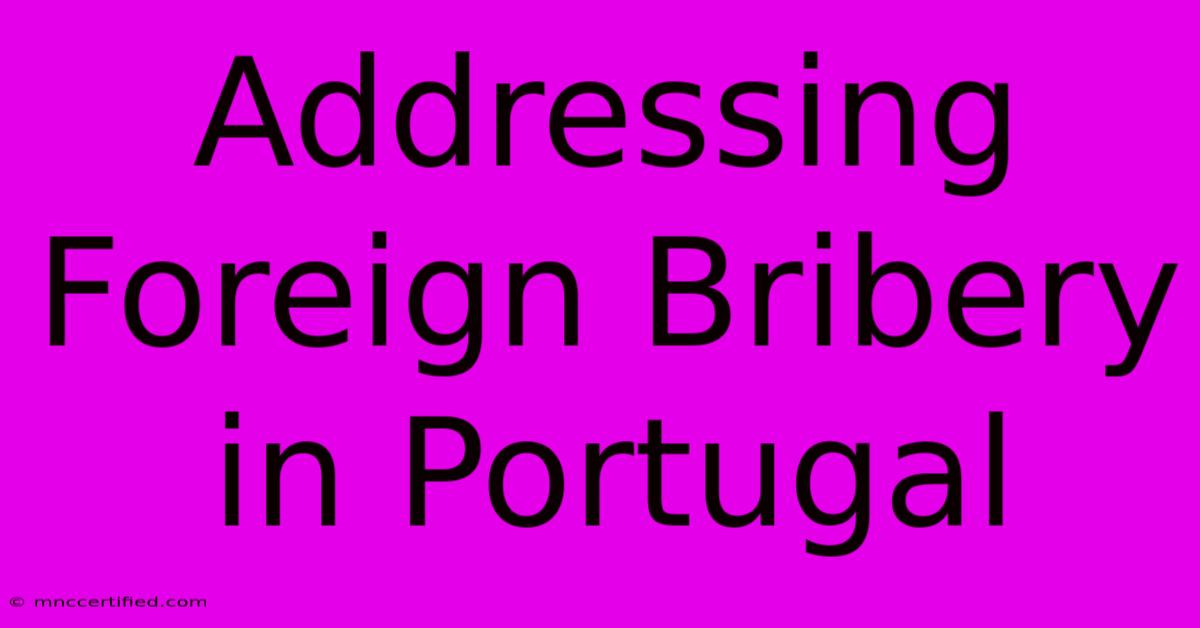Addressing Foreign Bribery In Portugal

Table of Contents
Addressing Foreign Bribery in Portugal: A Comprehensive Guide
Portugal, like many nations, faces the challenge of combating foreign bribery. This practice undermines fair competition, distorts markets, and hinders economic development both domestically and internationally. Understanding the legal framework, preventative measures, and investigative processes is crucial for businesses operating in or with Portugal. This article provides a comprehensive overview of addressing foreign bribery within the Portuguese context.
The Legal Landscape: Combating Foreign Bribery in Portugal
Portugal has robust legislation aimed at combating foreign bribery, primarily through its incorporation of the OECD Convention on Combating Bribery of Foreign Public Officials in International Business Transactions. This convention sets a global standard, and Portugal's implementation reflects a commitment to international anti-corruption efforts. Key aspects of the Portuguese legal framework include:
-
Criminal Code (Código Penal): Specific articles within the Portuguese Criminal Code criminalize bribery of foreign public officials, regardless of whether the bribe is offered, promised, or given. Penalties can be significant, including hefty fines and imprisonment for both individuals and corporations.
-
Corporate Criminal Liability: Portugal recognizes corporate criminal liability for foreign bribery. This means companies can be held accountable for the actions of their employees, even if committed without the knowledge or consent of senior management. This necessitates robust compliance programs.
-
Confiscation and Asset Recovery: The Portuguese legal system allows for the confiscation of assets obtained through foreign bribery, ensuring that perpetrators do not benefit from their illicit activities. This is a key deterrent.
Preventative Measures: Building a Robust Compliance Program
Proactive measures are essential to mitigate the risk of foreign bribery. Companies operating in or with Portugal should implement a comprehensive compliance program, encompassing the following:
1. Risk Assessment:
Conducting thorough due diligence and regular risk assessments is paramount. Identifying potential high-risk areas, such as interactions with government officials, is crucial for developing targeted preventative measures.
2. Code of Conduct and Ethics Training:
Implementing a clear code of conduct that explicitly prohibits bribery and related offenses is non-negotiable. Regular and mandatory ethics training for all employees, particularly those interacting with foreign officials, is vital. This training should cover local laws, best practices, and reporting mechanisms.
3. Internal Controls and Monitoring:
Robust internal controls and monitoring systems are needed to detect and prevent bribery. This includes establishing clear financial controls, implementing robust record-keeping practices, and regularly auditing financial transactions.
4. Whistleblowing Mechanisms:
A confidential and secure whistleblowing mechanism is crucial. Employees should feel comfortable reporting suspected instances of bribery without fear of retaliation. This mechanism must be clearly communicated and effectively managed.
5. Third-Party Due Diligence:
Conducting thorough due diligence on all third-party partners and agents is crucial. This involves assessing their anti-corruption policies and practices to minimize the risk of involvement in bribery schemes.
Investigation and Enforcement: Navigating the Process
If suspicions of foreign bribery arise, navigating the investigative process requires careful consideration. The Portuguese authorities, including the Public Ministry (Ministério Público) and law enforcement agencies, play a crucial role in investigations.
-
Cooperation with Authorities: Companies facing investigations should consider cooperating fully with the authorities, which can often lead to more lenient penalties. Seeking legal counsel specializing in white-collar crime and anti-corruption is highly recommended.
-
Internal Investigations: Conducting a thorough internal investigation can demonstrate a company's commitment to compliance and cooperation, potentially mitigating penalties.
-
Deferred Prosecution Agreements (DPAs): While not explicitly established in Portugal, the concept of DPAs is gaining traction, offering a path towards resolution without a full criminal prosecution. This necessitates demonstrating genuine remorse and implementing significant compliance improvements.
Conclusion: A Proactive Approach is Key
Addressing foreign bribery in Portugal demands a proactive and multifaceted approach. By implementing a robust compliance program, companies can significantly reduce their risk exposure and contribute to a fairer and more transparent business environment. Remember that prevention is far more cost-effective than dealing with the consequences of a bribery investigation. Staying informed about evolving legal standards and best practices is crucial for continued compliance and responsible business conduct in Portugal.

Thank you for visiting our website wich cover about Addressing Foreign Bribery In Portugal. We hope the information provided has been useful to you. Feel free to contact us if you have any questions or need further assistance. See you next time and dont miss to bookmark.
Featured Posts
-
Cobra Kai Season 6 Part 3 News
Nov 16, 2024
-
Bbc Radio 2s Kay Hints At Exit
Nov 16, 2024
-
Insurance Email Marketing Examples
Nov 16, 2024
-
Disney Stock On Track For Record Win Streak
Nov 16, 2024
-
Mr Miyagis Secrets Cobra Kai Season 6
Nov 16, 2024